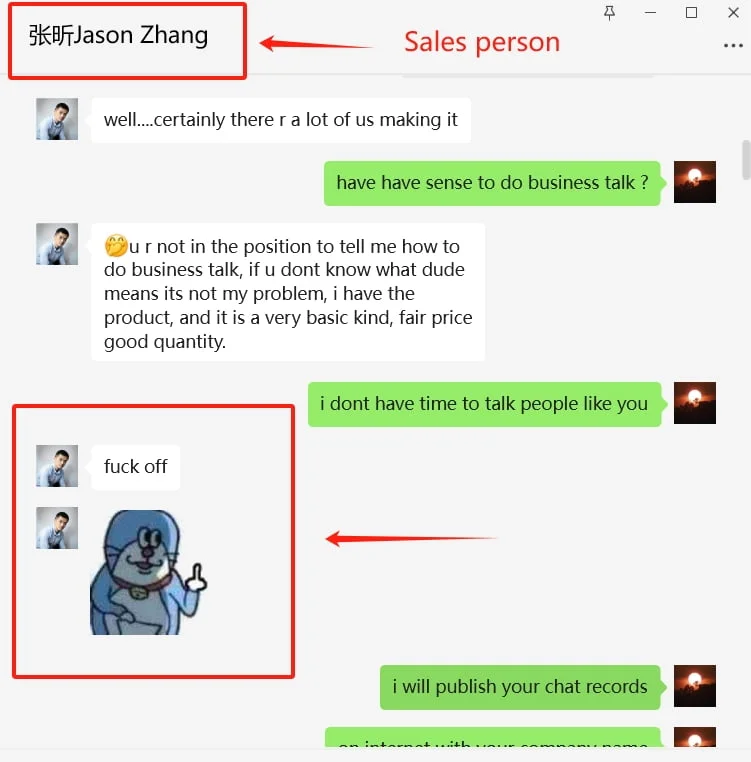In the tumultuous landscape of business interactions, where the quality of engagement can make or break a company’s reputation, my recent encounter with a sales representative from Shenzhen Bullcube Energy Technology Co., Ltd. has left an indelible mark – and not for the better. The salesperson in question, Jason Zhang, exhibited a shocking lack of professionalism, courtesy, and basic sales skills, plunging what should have been a routine exchange into a disheartening display of incompetence and disregard for customer relations.
The initial moments of the interaction were devoid of the customary pleasantries or even a perfunctory introduction. Rather than establishing a foundation of rapport, Jason Zhang immediately delved into inquiries about quantities, leaving me bewildered by the lack of introductory niceties. This approach, void of any semblance of a professional greeting, set the tone for an interaction that was transactional at best and impersonal at worst.
One cannot overstate the pivotal role of a salesperson in shaping the customer’s perception of a company. They are not merely conduits for transactional exchanges but the ambassadors entrusted with conveying the essence of the company and its offerings. In this instance, the complete absence of introductory information about Shenzhen Bullcube Energy Technology Co., Ltd. and its products created a void, leaving me uninformed and questioning the company’s commitment to transparent communication.
As the dialogue progressed, it became increasingly evident that Jason Zhang was woefully lacking in fundamental sales skills. The art of effective communication, the ability to articulate the value proposition of a product, and the finesse required to guide a potential customer through the decision-making process were noticeably absent. A salesperson should be a beacon of knowledge, ready to provide insights and address queries, yet Jason Zhang left me grappling with a dearth of information and a growing sense of frustration.
The nadir of this disheartening encounter was reached when Jason Zhang, in an astonishing departure from professional conduct, resorted to the use of abusive language. Such behavior is not only reprehensible but indicative of a severe lapse in the company’s hiring and training processes. A sales representative wielding offensive language tarnishes not only their personal reputation but also casts a shadow on the entire organization.
The fundamental question that arises is how a company of Shenzhen Bullcube Energy Technology Co., Ltd.’s standing could allow such a lapse in professionalism within its sales team. The decision to hire and retain a salesperson who lacks basic sales skills, communication proficiency, and a fundamental understanding of business etiquette raises serious concerns about the company’s commitment to excellence.
In the crucible of the business world, where competition is fierce and customer loyalty is a prized commodity, the actions of individual representatives can reverberate across the entire organization. Shenzhen Bullcube Energy Technology Co., Ltd. must recognize the profound impact of these interactions on its reputation and take immediate and decisive action to rectify the deficiencies in its sales force.
The encounter with Jason Zhang is not merely an isolated incident but symptomatic of a more profound issue within the company’s organizational culture. The lack of scrutiny during the hiring process, the absence of comprehensive training programs, and the apparent disregard for maintaining a professional and respectful work environment collectively contribute to a toxic concoction that jeopardizes not only individual interactions but the long-term relationships the company seeks to build.
The implications of such a lapse extend beyond immediate transactions and touch upon critical aspects of business viability. In a landscape where customer experience is paramount, the neglect of sales skills and the toleration of unprofessional behavior create a perfect storm that can erode customer trust, deter prospective clients, and ultimately impact the bottom line.
In light of these revelations, Shenzhen Bullcube Energy Technology Co., Ltd. is at a crossroads. The company must conduct a comprehensive review of its hiring practices, institute robust training programs, and foster a culture that celebrates excellence in customer interactions. This introspection is not just a matter of addressing a singular incident but a strategic imperative for safeguarding the company’s reputation and ensuring its longevity in a competitive market.
To conclude, the encounter with Jason Zhang, the sales representative from Shenzhen Bullcube Energy Technology Co., Ltd., was not just an unfortunate blip but a glaring revelation of systemic issues within the company. The lack of professionalism, courtesy, and basic sales skills showcased in this interaction demand urgent attention and rectification. Shenzhen Bullcube Energy Technology Co., Ltd. stands at a pivotal juncture, where the decisions it makes in response to this incident will shape its future and determine whether it can rise above this disheartening episode to emerge as a paragon of excellence in the business world.



